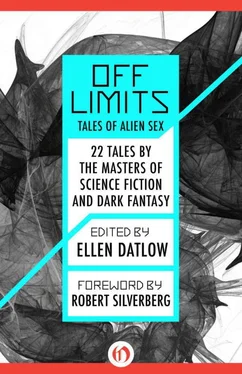Fritz Pathori’s quarters were on the research deck. The boys reached them by climbing the spiral stairs leading up to the second level, speaking in whispers even though there was little chance of anyone seeing them there, or caring if they did. Midway up the steps Paul could see his father’s chambers, across the open area that had once held several anaglyphic sculptures. The sculptures had long since been destroyed, in one of the nearly ritualized bouts of violence that periodically swept through the station. Now his father’s balcony commanded a view of a narrow concrete space, swept clean of rubble but nonetheless hung about with a vague odor of neglect and disrepair.
When they reached the hallway leading to the chief geneticist’s room the boys grew quiet.
“You never come up here?” Claude asked. For once there was no mockery in his voice.
Paul shrugged. “Sometimes. Not in a while, though.”
“I’d be here all the time,” Ira whispered. He looked the most impressed, stooping to rub the worn but still lush carpeting and then tilting his head to flash a quick smile at himself in the polished metal walls.
“My father is always busy,” said Paul. He stopped in front of the door to his father’s chambers, smooth and polished as the walls, marked only by the small onyx inlay with his father’s name engraved upon it. He tried to remember the last time he’d been here—early autime, or perhaps it had been as long ago as last Mestris.
“Can you hear anything?” Claude pushed Ira aside and pressed close to the door. Paul felt a dart of alarm.
“I do,” whispered Ira excitedly. “I hear them—listen—”
They crouched at the door, Paul in the middle. He could hear something, very faintly. Voices: his father’s, and something like an echo of it, soft and soothing. His father was groaning—Paul’s heart clenched in his chest but he felt no embarrassment, nothing but a kind of icy disdain—and the other voice was cooing, an almost perfect echo of the deeper tone, but two octaves higher. Paul pressed closer to the wall, feeling the cool metal against his cheek.
For several more minutes they listened, Paul silent and impassive, Claude snickering and making jerking motions with his hands, Ira with pale blue eyes growing wide. Then suddenly it was quiet behind the door. Paul looked up, startled: there had been no terminal cries, none of the effusive sounds he had heard were associated with this sort of thing. Only a silence that was oddly furtive and sad, falling as it did upon three pairs of disappointed ears.
“What happened?” Ira looked distressed. “Are they all right?”
“Of course they’re all right,” Claude hissed. He started to his feet, tugging Ira after him. “They’re finished, is all—come on, let’s get out of here—”
Claude ran down the hall with Ira behind him. Paul remained crouched beside the door, ignoring the other boys as they waved for him to follow.
And then before he could move the door opened. He looked up and through it and saw his father at the far end of the room, standing with his back to the door. From the spiral stairs Claude’s voice echoed furiously.
Paul staggered to his feet. He was just turning to flee when something moved from the room into the hall, cutting off his view of his father; something that stood teetering on absurdly long legs, a confused expression on its face. The door slid closed behind it, and he was alone with the argala.
“Oh,” he whispered, and shrank against the wall.
“ O, ” the argala murmured.
Its voice was like its scent, warm yet somehow diffuse. If the hallway had been dark, it would have been difficult to tell where the sound came from. But it was not dark, and Paul couldn’t take his eyes from it.
“It’s all right,” he whispered. Tentatively he reached for it. The argala stepped towards him, its frail arms raised in an embrace. He started, then slowly let it enfold him. Its voice echoed his own, childlike and trusting.
It was irresistible, the smell and shape of it, the touch of its wispy hair upon his cheeks. He opened his eyes and for the first time got a good look at its face, so close to his that he drew back a little to see it better. A face that was somehow, indefinably, female. Like a child’s drawing of a woman: enormous eyes surrounded by lashes that were spare but thick and straight. A round mouth, tangerine-colored, like something one would want to eat. Hair that was more like feathers curled about its face. Paul took a tendril between his fingers, pulled it to his cheek and stroked his chin with agonizing slowness.
His mother had told him once that the argalæ were engineered from human women and birds, storks or cranes the boy thought, or maybe some kind of white duck. Paul had thought this absurd, but now it seemed it could be true—the creature’s hair looked and felt more like long downy filaments than human hair, or fur. And there was something birdlike about the way it felt in his arms: fragile but at the same time tensile, and strong, as though its bones were lighter than human bones, filled with air or even some other element. Paul had never seen a real bird. He knew they were supposed to be lovely, avatars of physical beauty of a certain type, and that their power of flight imbued them with a kind of miraculous appeal, at least to people Below. His mother said people thought that way about women once. Perhaps some of them still did.
He could not imagine any bird, anything at all, more beautiful or miraculous than this geneslave.
Even as he held it to his breast, its presence woke in him a terrible longing, a yearning for something he could scarcely fathom—open skies, the feel of running water beneath his bare feet. Images flooded his mind, things he had only ever seen in ‘files of old movies. Small houses made of wood, clouds skidding across a sky the color of Ira Claire’s eyes, cream-colored flowers climbing a trellis beside a green field. As the pictures fled across his mind’s eye his heart pounded: where did they come from? Sensations spilled into him, as though they had been contained in too shallow a vessel and had nowhere else to pour but into whomever the thing touched. And then those first images slid away, the white porch and cracked concrete and saline taste—bitter yet comforting—of tears running into his mouth. Instead he felt dizzy. He reached out and his hands struck at the air feebly. Something seemed to move at his feet. He looked down and saw ripples like water, and something tiny and bright moving there. A feeling stabbed at him, a hunger so sharp it was like love; and suddenly he saw clearly what the thing was—a tiny creature like a scarlet salamander, creeping across a mossy bank. But before he could stoop to savage it with his beak (his beak?), with a sickening rush the floor beneath him dropped, and there was only sky, white and grey, and wind raking at his face; and above all else that smell, filling his nostrils like pollen: the smell of water, of freedom.
Then it was gone. He fell back against the wall, gasping. When he opened his eyes he felt nauseated, but that passed almost immediately. He focused on the argala staring at him, its eyes wide and golden and with the same adoring gaze it had fixed on him before. Behind it his father stood in the open doorway to his room.
“Paul,” he exclaimed brightly. He skinned a hand across his forehead and smiled, showing where he’d lost a tooth since the last time they’d met. “You found it—I wondered where it went. Come on, you!—”
He reached for the argala and it went to him, easily. “Turned around and it was gone!” His father shook his head, still grinning, and hugged the argala to his side. He was naked, not even a towel draped around him. Paul looked away. From his father’s even, somewhat muffled, tone he could tell that he’d recently come from the neural sauna. “They told me not to let it out of my sight, said it would go sniffing after anyone, and they were right…”
Читать дальше












